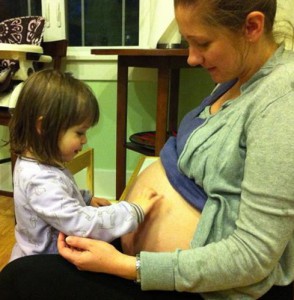As I’ve stated many times to anyone who will listen, nipple shields can be helpful if a baby is having trouble breastfeeding. In the wrong hands, however, they can be downright dangerous. Just today I saw 2 moms who were given nipple shields in the hospital within 48 hours of their babies’ birth. Their 2 stories had very different outcomes.
Story number 1: Three -week- old baby. Mom given nipple shield day 2 because baby was having a hard time latching. Baby was able to latch with the shield, but he nursed for 45 minutes to an hour each feeding and never seemed satisfied. Things seemed to go OK the first week, but at a routine check-up 2 weeks later, baby hadn’t gained any weight. The pediatrician told mom to start supplementing immediately and referred her to me. I saw her the next day. Continue reading

 Yes! A prenatal consultation or private breastfeeding class would be perfect for you. You can address your specific challenges and fears in a safe, private setting.
Yes! A prenatal consultation or private breastfeeding class would be perfect for you. You can address your specific challenges and fears in a safe, private setting.